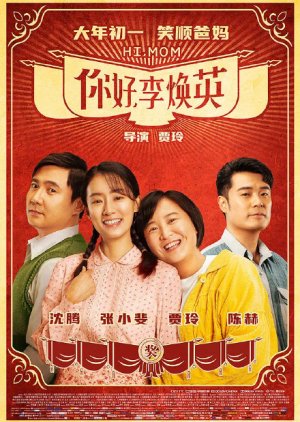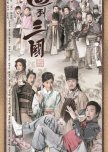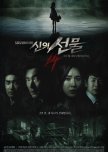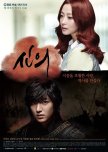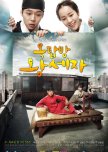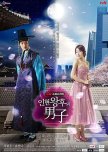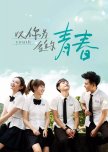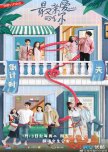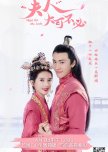
Good enough.
This is a comedy will make you cry as hard as it will make you laugh. It is a very personal, very moving tribute of comedian, actress, screenwriter and first time director Jia Ling to her mom, Li Huanying - factory worker, volleyball player and first person in Xiangyang to own a TV.I tried to watch this shortly after its release but dropped it within ten minutes because I was put off by the fact that Jia Ling chose to play herself, the then 18-year old Jia Xiaoling. In her late 30s at the time, she just doesn't look the part of a teenager so I abandoned it before I realised that nonetheless, she feels the part because she IS the part; every emotion is heartfelt down to the tiniest nuance. And of course she is who she is today because she is a funny lady, very, very funny with excellent comedic timing. Nonetheless, the criticism that the main role is possibly mis-cast is a valid one. There are some rough edges to the overall production that are very acceptable considering this is her directorial debut.
The main premise is simple, based on universally relatable mother daughter themes. Like many, I can vividly remember being 18, feeling awkward, unaccomplished, insecure and possibly a factory production run error of my lovely and vivacious mother. We have all been Jia Xiaoling, wanting to make our mom's proud, longing desperately to be worthy while dead set certain we are not. A freak of nature transports Xiaoling back to the past, where she meets and befriends her young mom and has a chance to be a part of all the most important events in her life. She hilariously and movingly tries to change her life for the better even if it means her mom ends up with someone else to hopefully have a more worthy daughter.. And in the process she movingly comes to the realisation that she was always already good enough. These are tried and true mother daughter themes that may seem to have been beaten to death but Hi Mom still manages to articulate a fresh, creative take and deliver a moving, heartfelt twist to this tale as old as time.
This is not perfect but I can happily give it a 9.0 and call it a masterpiece because it is an unforgettable movie that will make you call your mom or hug her if you are lucky enough to be next to her. After all, this humble, low budget production is only the highest-grossing movie of 2021, the second highest-grossing non-English film of all time, and the highest-grossing film by a solo female director. If like me, you haven't seen your mom for over a year due to covid, you may want to wait to watch this. But you must definitely watch it.
Was this review helpful to you?

This review may contain spoilers
beautiful and imaginative storytelling, augmented by the performances, et al
this is an imaginative and beautiful drama with comedy that is sentimentally warm and touching. the story is based on the director's relationship with her mother, and is about a personal reconciliation with regret/grief, love, redemption, and filial piety. the director also plays the role of the daughter in this film. the humor tends to be light, silly humor through the play of words, and sometimes infused with exaggerated/corny dialogues and nonverbals.the mother and daughter share a very close relationship. as the daughter grows up to young adult, the mother has certain expectation for her daughter as she does not want her daughter to be looked down by their relatives.. however, before the daughter could realize the expectation, an accident occurs that somehow transports the daughter back in time. in this new reality, the daughter gets to acquaint herself with the younger version of her mother. the daughter decides to reconciles with her regret/grief, and to redeem herself by trying to make her mother's more pleasant. but, the whole experience has a surprising twist.
overall, i feel that there are several aspects about this film that feel mature/ripe, well planned, controlled and executed. it's a 2-hour long show, and some audience might find a few segments that feel a bit draggy in this film, other than that i find the overall experience watching this film to be enjoyable. it's by far one the better film i've watched since the start of 2021.
//spoilers//
for me, there are several highlights to the film,
i) the actors are mostly unknown outside of China, yet their performances are enjoyable. i recognize only the actor who plays "Guangyin". there are the obvious observable exaggerations in certain performances. what is noteworthy is that this exemplifies that decent actors and decent performances have no direct correlation with popularity, having beautiful/handsome faces, and sexy/muscular bodies.
ii) the efforts and details to replicate early 80s China, even down to the hairstyles and army-like caps. also, if you missed it, right at the beginning, there is actually a green army cap present worn by a kid, and then later in the show there is another version of an army-like cap that common folks wear which is popular during that period.
iii) if there is dubbing (voice over), it's synchronized very well and feel natural. and, if you are familiar with the regional accents, the beginning part of the film is automatically obvious.
iv) i can actually sense/feel an undercurrent of emotion stirring under the surface, as i watch from beginning to end.
v) there are moments in the film that i am actually reminded of my Mom when i was younger. for example a) picking up different skills; b) often come to my elementary school to deal with the teachers and/or principal; c) my Mother used to play volleyball on a regular basis between late 70s and early 80s.
vi) it starts to get more humorous right from the 'failed movie dating' scene
vii) the entire final quarter is the climax
viii) the film is released in 2021. the setting of the 'present' in the film is 2001, which is observable from the report card early in the film. the majority of film takes place in 1981, just a few years after Deng Xiaoping announced China's open door policy.
ix) mid way through the film, there is an self-introspective moment. there is that moment of realization, if you change the past, the present will be affected. this is more of a modern concept. and if you consider the traditional Chinese belief that if something is fated/destined (aka meant to be), no matter what you do, the outcome will still be the same. compare and contrast that with Marvel film's concept, whereby changing your past doesn't actually change your present, it merely creates a new future based on that changed past. your present thus becomes your past, and there might be no you or a different you in the new future. however that self-introspection segment midway through the film has a continuity twist at the final quarter of the film.
ps. not related with this film, i just found out there is another older film with the same title, "Hi, Mom," a 1970 film starring Robert de Niro.
Was this review helpful to you?

A warm movie..beautiful..cute..moving emotions
Chinese comedian Jia Ling makes her directorial debut in Hi, Mom 《你好,李焕英》, bringing her humour into a heartfelt story about a mother-daughter relationship.The script for Hi, Mom is based on Jia Ling’s comedy skit of the same name, which was, in turn, inspired by her own mother’s passing. Together with her co-writers, the script took more than three years to finish. Filming took place in Xiangyang, Hubei, the hometown of director Jia Ling. The film has been met with huge financial success. It has become the highest-grossing film of 2021, the second highest-grossing non-English film, and the highest-grossing film by a solo female director — not just in China, but of all time.
The film revolves around Jia Xiaoling (Jia Ling) and her mother Li Huanying (Zhang Xiaofei), whom the film endearingly dubs Ling and Ying respectively. After a motor accident leaves Ying hospitalised, Ling accidentally travels back in time to 1981 and meets a younger Ying who is working in an iron factory. Ling, feeling as though she has never made her mother proud in her life, decides to use this opportunity to redeem herself.
The dynamic between Ling and Ying is a very interesting one. It starts off as a mother-daughter relationship but evolves into a close friendship once Ling meets younger Ying. This duality helps surprise viewers with what Ying was like in her youth, while also showing how many of her beliefs have been rooted in her character since young and have remained unchanged through the years.
Ling believes that in order for her mother to be proud of her, she needs to achieve certain goals in life. She thinks these come in the form of her educational or financial success. When Ling realises she has travelled back in time, she uses what she knows from the future to make her mother’s life better. She pushes Ying into specific situations and motivates her to take on tasks that she was otherwise apprehensive about.
Along the way, Ying meets several other characters who help orchestrate her plans — a gangster turned good friend Leng Te (Chen He), and the iron factory manager’s son Shen Guanglin (Shen Teng). Both characters are very well-fleshed-out despite not being part of the main cast.
On the surface, Leng Te seems like your typical bad boy character but is revealed to have a heart of gold. He may be a little daft but he makes missteps out of foolishness rather than with ill intent. Leng Te’s relationship with his family is shown briefly and this moment gives us a glimpse of how every family struggles differently.
Shen Guanglin is trying to shake the stereotype tied to him that he is a spoilt kid whose privilege has made life easy for him. As he tries to woo Ying, he also takes the opportunity to prove himself. He grows into his own person independent of his father’s approval, and makes choices to prove it. The film also uses his character to discuss themes of class inequality and nepotism, which is very poignant against the setting of the working class.
The film uses humour in a variety of ways. Hi, Mom nails its punchlines when delivered, which is aided by the characters’ strong personalities and relationships. The film also utilises a lot of non-verbal cues to deliver its jokes, including visual comedy. The interactions between the characters are entertaining to watch and come across very naturally so that they do not feel forced.
Although Hi, Mom touts itself as “the all time #1 comedy in China” and can certainly land its jokes when it needs to, it does not shy away from serious themes and drawing out emotions either. In fact, I believe the movie’s main driving force is its heartfelt portrayal of motherly love and familial relationships. It is these touches of reality that help ground the film and remind viewers that its messages are not drawn from fiction.
The relationship between Ling and Ying creates several emotional moments that show us the ups and downs of families, while still warming our hearts with the love and care that the two characters share with each other to get through life. Ling shows immense growth in her understanding of her mother’s character over the course of the movie as well as her own perception of herself. This reveals Ying’s unbounding love for her daughter despite all that she sees of herself, and shows us the true meaning of a mother’s love.
In terms of the film’s technical aspects, colour is a very interesting metaphor in the film and it helps add a layer of depth that transcends words. The phrase “bringing colour to life” perhaps best describes the film’s approach here. When Ling is transported through time and falls into 1980s Hubei, the backdrop of a once black-and-white era comes to life with vibrancy and she knows that she is truly living in and experiencing the environment around her and not simply hallucinating from images she has seen before.
The use of colour also emphasises the idea of finding joy in things that are taken for granted, such as when Ling sees the happiness that early technology brings to Ying and her friends despite such technology being obsolete to her. She casts aside what she knows and basks in the moment that is shared among them.
Hi, Mom hits home several inspiring messages about family and love. I believe it teaches us to see our family beyond their material achievements and to put their happiness first. It also shows the importance of parental figures and highlights the sacrifices they make. Audiences online have described their renewed feelings to connect with their own family after seeing the film. It effectively tells a story that is both comedic and emotionally significant in its own way.
Was this review helpful to you?

